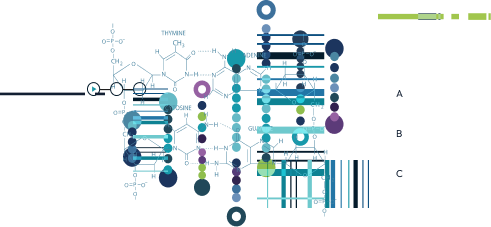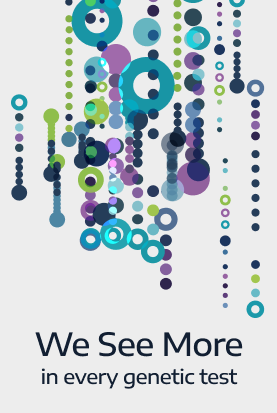News Center

Variantyx Expands Into Prenatal, Cancer Testing
- By Variantyx
- Posted in General Company Updates
Genomeweb | May 11, 2021
Variantyx, a genetic testing company offering clinical whole-genome sequencing-based assays, is expanding its menu to include prenatal and pan-cancer testing in the US.
The firm’s Genomic Unity Prenatal Analysis test, to be used when an ultrasound identifies structural anomalies in a fetus, launched in January and will be available by the end of the second quarter. The test analyzes amniotic fluid as well as blood from both parents to provide a genomic analysis of the fetus.
Variantyx’s genomic profiling test for cancer, which will analyze both tumor and normal tissue, is in development and should be available by the end of the third quarter, said CEO Haim Neerman. The test will employ artificial intelligence technology for somatic mutation detection licensed from IBM in December 2020 and could have applications in recurrence monitoring, pharmacogenomics, clinical trials, and recommending treatment. Neerman declined to disclose the terms of the IBM deal.
The new assays will expand Variantyx’s existing clinical testing menu for hereditary disease, built on WGS and its algorithms for genomic variant detection including structural variants (SVs). Traditionally, the firm’s main market has been in neurology and rare disease genetics. According to Neerman, the company is already servicing prominent healthcare systems in the US, including Penn Medicine, Mayo Clinic, the Cleveland Clinic, Emory Healthcare, Mount Sinai Health System, and Johns Hopkins Medicine.
Spokespeople for Cleveland Clinic and Mayo declined to comment and representatives from Penn, Emory, Mount Sinai, and Johns Hopkins did not respond to requests for comment.
Launched in 2014 as a clinical decision support engine, Variantyx has taken genomic analysis technology licensed from Israel’s Tel Aviv University and built an international company that now operates in the US out of Framingham, Massachusetts.
Using a whole-genome sequencing approach has helped Variantyx provide test quality that Neerman claims targeted assays can’t match. Using PCR-free sample prep helps get “the cleanest data” and coverage of 99.8 percent, he said. WGS also helps provide information for detecting structural variants, detected either with algorithms or supplemental long-read sequencing from Pacific Biosciences’ platform, and provides a backstop for difficult diagnostic cases.
Variantyx’s pipeline analyzes several types of SVs, including long repeats greater than 2 kb, as well as non-uniquely mappable regions, mitochondrial DNA, indels, and duplications. In 2019, Variantyx researchers published a validation study of the firm’s SV detection capabilities in BMC Genomics. “Using a combination of breakpoint analysis of split and discordant reads, and read depth analysis, the pipeline identifies structural variants down to single base pair resolution,” they claimed, noting that consistent read depth from PCR-free prep was crucial. Neerman said the firm has analyzed nearly 4,000 clinical samples with its WGS pipeline so far.
Variantyx’s tests are “very helpful” for extremely complicated cases, Richard Frye, a neurologist at Phoenix Children’s Hospital, said in an email. “They have in-depth analysis and can provide the detailed data from the analysis for [even] more in-depth analysis by a neurogenetic specialist, if that is needed,” he said.
The company has grown to about 100 people, Neerman said, with about a third on its clinical team, and processes about 500 genomes a month. It raised $20 million in March in a Series C financing round, with plans to launch in the oncology market, where it expects to compete with Foundation Medicine and Tempus, a company spokesperson said.
Variantyx still outsources a lot of sequencing to Psomagen, Macrogen’s US subsidiary, but is planning on bringing more of it in house, Neerman said. Turnaround for samples sent out is four to five weeks and the company hopes it can offer results faster doing its own sequencing, starting in August.
Neerman attributed the firm’s success to its reimbursement strategy, as well as its Analyses. While the company sequences the whole genome of every sample, tests can be ordered as so-called “virtual panels,” providing results only for the sets of genes ordered, which helps with reimbursement. “Eventually, everybody will reimburse for whole-genome sequencing,” Neerman said. Some major payors — such as Blue Shield of California — already do cover WGS for rare pediatric diseases in certain cases, “but sometimes people want to look at certain conditions, they don’t want to see everything else,” he said. Other times, clinicians don’t have flexibility in what they can order. “Their hands are tied,” he said.
Also, having that whole genome can be a useful backstop. If the virtual panel does not answer the clinician’s questions, he or she can always reflex to the whole genome.
“Whole-genome sequencing is difficult to get covered by insurance much of the time but Variantyx does a great job, being seamless from taking to order to getting approval to getting the test kits to the families and getting us the results,” Frye said. “The customer service is great.”
Variantyx has secured reimbursement from “more than half of commercial payers,” Neerman said, who cover 170 million US patients. Whole-genome sequencing has high diagnostic yield, he added, and recent improvements to the cost of sequencing could provide even more value to the company. Illumina’s recent release of its NovaSeq v1.5 reagents, which that company says can reduce the price of a human genome sequenced at 30X coverage to $600 when the flow cell is run at the highest sample throughput, is a step in the right direction, Neerman said.
And with rising quality for long reads, Variantyx is planning to do more of it on the Oxford Nanopore Technologies platform.
“In the not-so-far future, probably the fourth quarter of this year, we plan to sequence every sample with long and short reads,” Neerman said, though it will be low-pass sequencing to keep costs down, with enough coverage to augment SV detection with Illumina sequencing.
Variantyx Expands Into Prenatal, Cancer Testing | Genomeweb
